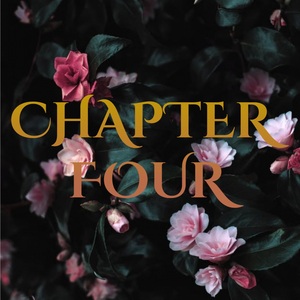I carefully climbed down from the low roof, red faced and sweaty from hours of difficult labor. My fingers ached, and the tips of them were raw and covered in cuts. I could feel the blisters forming, and I didn’t look forward to what condition they would be in by tomorrow.
It was blissfully cool and dark inside the house, but I still longed for the modern conveniences of air conditioners, or even just a fan. Erik was portioning out the rabbit meat between two plates and I took mine eagerly, without even bothering to inspect the cleanliness of the dish. I’d never had rabbit before, and it was... interesting. Unseasoned and cooked in a very basic way, but the flavor of the meat itself was pleasant, and I was so hungry that I scarfed it down so fast that I hardly tasted it at all. Erik still somehow finished before me, and was standing below the hole in the roof, inspecting my work from below.
“You’re very slow at it,” he said. “You’re not even halfway done. It isn’t that big of a hole.”
“I’ve never done this before!” I protested indignantly, wiping rabbit grease from my chin with the back of my hand. “I don’t know what I’m doing up there! Plus I can hardly lift my arms above my head, I still hurt so bad. If you want it done faster, do it yourself!”
“If I’d known it would take you this long, I would have just sent you on your way and done it myself. Now that you’ve started, you might as well finish, though.”
“That’s terrible logic.”
“It’s the principle of the thing. I’m not letting you off that easily now, especially if I’m going to have to keep feeding you and take you all the way to town. Think of it as an inconvenience tax.”
“You think you’d be grateful for a little company, all alone out here in the middle of nowhere,” I grumbled.
“I don’t need anyone’s company,” Erik snapped, his tone suddenly so harsh that it startled me a little. He saw my expression, and he seemed to struggle to reign his temper back in. “I prefer my privacy,” he amended, in an obvious attempt to keep his tone polite.
“Seems so,” I muttered under my breath. Obviously I’d struck a nerve. Man, I hoped this guy wasn’t an axe murderer. I guess he’d already had all the previous night to axe-murder me if he had wanted to, but still.
“I’ve got to get these skins drying,” Erik said abruptly, standing up and grabbing the skinned and cleaned rabbit pelts from where he had hung them. He left the room without a backwards glance, and I felt a little relieved.
I didn’t exchange another word with Erik for the rest of the day, and I worked harder than ever up on that roof to get as much done as possible. By the time it started to get too dark to work, I stood back to survey what I had done so far. I’d actually made pretty good progress. I had had to stop part way through to make more bundles of straw, but that had only set me back by a little. I’d gotten it down to a rhythm, and while the section I had made didn’t look anywhere as neat and even as the rest, it was definitely thick and well secured, and would hopefully last until the entire roof got re-thatched in a few months. And if it didn’t, well, I’d be long gone by then, so not my problem.
Still, as lousy as I felt physically, I couldn’t help but feel a sense of pride at what I had managed to accomplish. It was in slightly better spirits that I finally headed inside with, determined not to let myself be brought down by any critical comments Erik might have in store for me.
However, he hardly spoke to me at all when I entered the little cottage. Dinner was whatever rabbit meat that was leftover from lunch and, you guessed it, more pease porridge.
“I only go into town about once a month, so my supplies are low right now,” he grumbled, avoiding making eye contact as he handed me a bowl of the stuff. He was clearly still in a weird mood from earlier.
Every ounce of common sense I had told me to keep my mouth shut, eat my porridge, and head straight to bed to catch up on the pre-dawn sleep I’d missed out on this morning. I had never been known for my good use of common sense however, and I found my mouth attempting to engage in awkward small talk before my brain could stop it.
“So, what are you doing out here in the middle of the woods?”
Erik gave me a strange look, his spoon halfway to his mouth. “…Eating?”
I felt my cheeks flush. “No, I mean like… what do you do out here? Obviously you hunt things,” I cast a glance around the room at the countless furs lining the walls, “but is that your… your job, I guess? Are you a hunter, or a trapper or something?”
Erik set his spoon down in his bowl and leaned back in the armchair he was sitting in. He just looked at me for a long moment, as if trying to decide whether he was going to answer or not. The prolonged eye contact made me feel uncomfortable, so I awkwardly shoved a few more spoonfuls of cold porridge into my mouth just to give me something to do.
“Hunting and trapping are two ways that I make my living, that’s true. I sell the meat and fur of what I catch, deer and rabbit mostly; and collect on bounties for creatures that are causing trouble, whether that means killing them, like the wolves, or just driving them out of town, like the giants last month. But that’s not why I live out here.”
“And… why is that?” I asked, wondering if I was pushing it too far.
Erik didn’t snap at me this time though. He just raised an eyebrow and said, a tad mockingly, “What, you want a bedtime story?”
I spluttered, red faced, but he waved my protests away. He sort of made a face that could have been mistaken for a smile—in the dark, from a distance.
“Fine, fine. I’ll tell you how I came to live in this cottage.”
Erik’s Story
It was the day of the farmer’s son’s sixteenth birthday, and the day that he was old enough to leave his family’s home and go out into the world to seek his fortune.
His parents were hardworking, but very poor, and the farmer’s son desired to make a name for himself and bring back wealth and status to his family, to support his parents in their old age as they had supported him.
When he left home on the morning of his sixteenth birthday, he brought with him only some bread and cheese to eat, a few copper coins, and a rough woolen blanket to keep him warm on the long, cold nights. He bade his loving parents goodbye as he left, giving his beautiful mother, whose eyes filled with tears to see her only son leave home, one last embrace, and shaking his proud father’s hand.
He assured them that when he returned, he would be laden with riches and accolades for what he had accomplished during his adventures in the wide world, and with that, he left his boyhood home.
The farmer’s son walked all day, and long into the night. When he became too weary to go any further, he stopped in a forest clearing and lied down, wrapping himself in his blanket to fend off the cold of the night. Exhausted from his long traveling, he slept soundly and did not awaken as someone approached his slumbering form. It was a nightmare that woke him, and as he sat up and looked around, still fearful from the ill dreams, he saw and old hag sitting on a rotted old tree stump, not twenty paces from where he lay.
At first he leapt to his feet to defend himself, but when he realized it was only an old and decrepit woman, he knew she could do him no harm.
‘Old woman, why do you watch over me as I sleep?’ he asked of her.
‘I did not wish to wake you,’ she said in a voice as cracked and dry as a desert. ‘But I have been traveling long through the night, and I am so weary that I had to rest when I found this place.’
As she spoke, he noticed that she was clad in naught but a thin, black cloak. The night was cold, and not yet over. He feared she may freeze before the sun’s warming rays rose over the treetops.
‘Come here, good mother, and take my woolen blanket. You will freeze to death if you stay how you are.’
The crone stood up stiffly and hobbled over to him, and he draped his blanket over her thin shoulders.
‘Are you hungry? I have bread and cheese, if you wish. It is not much, and it is all I have in the world to eat, but I am young and strong, and you need it far more than I.’ And so he gave her what was left of his precious food. ‘You can sleep here, if you have nowhere else to go. I will watch over you, and make sure that no animals bother you as you sleep.’
So the farmer’s son spent the remainder of the night diligently guarding the old woman, ignoring the cold in his bones and the hunger gnawing in his stomach.
When she awoke the next morning, she wordlessly stood to take her leave.
‘Wait!’ the farmer’s son urged. He handed her a tall, straight branch that he had found during the night. ‘I noticed that you walk with a limp, so I found this. A walking stick, to ease your pain.’
She took it from his gratefully. He then pressed all of his few precious copper coins into her gnarled old hand and said, ‘You need these far more than I do. I am young, and can find good work that pays well in cities and towns doing labor; but you are old and weak, and cannot. So take these, before you be on your way.’
At this, the old woman grinned a toothless grin at him, and took his hands in both of hers. ‘Child’, said she, her voice no longer old and cracked but young and sweet and as beautiful as tinkling bells. ‘You are pure of heart. You have selflessly helped an old woman in need, with no wish of compensation. You have given her all you own in the world, recognizing the need of others above your own. I am no mere old crone, but a powerful fairy.’
At this, she threw off her disguise, and before the farmer’s son stood the most beautiful woman in all the land. ‘For your good deed, I shall ensure that you should want for nothing.’
She waved a pale arm, and an entire house sprung up from the ground in the middle of the clearing. ‘In this house you will find a stove which will burn eternally. The flames will never need to be stoked, and they shall never go out, keeping your home and your dinner warm for as long as you live. This is for the blanket you gave to protect me from the cold. Beside the stove, you will find a bow and a quiver of arrows. These are enchanted, and with them you will never miss your mark. May you experience good fortune whenever you hunt. These are for the last of your food that you gave to me. And buried in the yard behind the house, is an iron box.
‘What lies in it is what you will need the most to ensure you live a life of happiness with a heart free of doubt, but you will only be able to open at the right time, when you find the key. This is for the few copper coins you had that you graciously bestowed upon me, leaving yourself penniless and with nothing left to help you on your journey.’
And with her sweet words still lingering in the air, she vanished from the spot, leaving him alone with his new fortune.
* * *
“Wow. Did all that really happen?” I asked Erik, enraptured by his story.
An irritated expression replaced the pensive one he had been wearing while recounting his tale. “What, do you think I made it all up?” he snapped.
I went red, and hastily tried to explain myself. “No, no! I didn’t mean it like that, it was just so… magical, straight out of a fairy tale.”
Erik expression transitioned from annoyed to confused. “What? No, the fairy didn’t have a tail. What are you talking about?”
I almost laughed but managed to keep a straight face. “No, not like a fairy tail; I meant like… actually, it doesn’t matter, it’s just an expression.”
Erik gave me a funny look, but seemed to shrug the moment off.
“So now you know what I’m doing here in the middle of this forest. Now it’s your turn. What exactly were you doing out in the woods, alone, that led you to my doorstep? Or through my roof, rather.”
“I was being chased by wolves,” I explained slowly, as if it should have been obvious.
A tick started up in Erik’s jaw. “What were you doing in the forest before that?”
“Walking around, mostly.”
“To where?”
“To anyplace that wasn’t the woods. I wasn’t feeling particularly picky at the time.”
“From where?”
“From… my own town.”
“Which is?”
“Far away.”
Erik threw his half empty bowl down, his spoon clattering to the floor. “Alright, fine,” he snapped. “If you’re going to be like that—”
“Okay, okay,” I said quickly, placatingly. We were already getting on each other’s nerves badly enough as it was. As much as I didn’t want to attempt to explain the convoluted mess that led me here and where I was actually from, Erik obviously wasn’t having any of my BS answers anymore. I was sure I could somehow twist the events into something plausible, at least by fairy tale standards, that would be enough to satisfy my unwilling host.
I took a deep breath, more for the extra second of desperate quick thinking that I was doing to come up with a good enough story. “Once upon a time—” I hedged, but I didn’t get much farther than that.
A quaking rumble beneath our feet made my next words die in my throat, and I looked around in uncertainty. “Was that an earthquake?” I asked.
Erik didn’t respond. When I looked at him, I saw all the color had drained from his face, and he was looking towards the door with a hunted expression.
“What—” I said, but he immediately shushed me.
A second later, there was another rumble, and then a third, and a forth. Then I realized that it didn’t really feel like an earthquake at all; it was more like the deep bass rumbles that you feel from the ground when a car playing their music too loud drives past, each bass note sending tremors through your whole body. Then there were sounds to accompany the shaking of the earth—the cracking of trees, and the chanting of a voice like thunder.
“FEE FI FO FUM!”
“What the hell—” I began, but Erik leapt to his feet and grabbed me by the wrist, yanking me out of my chair. He looked at me with something that looked worryingly like panic in his eyes.
“Giants,” he whispered.











Comments (0)
See all